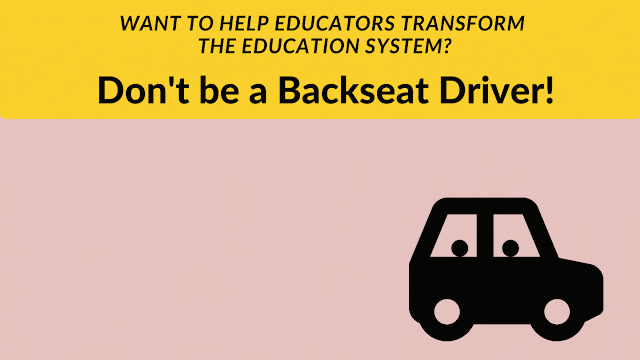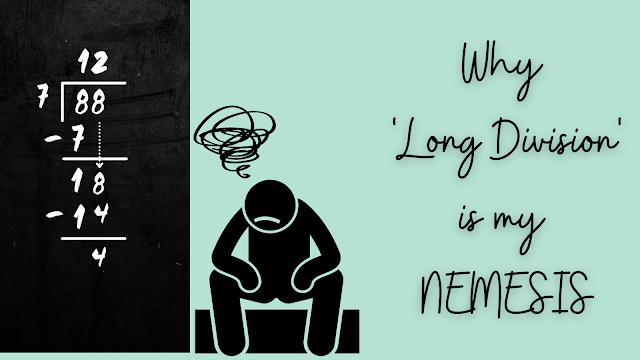Do you want to help educators transform the education system? Don't be a backseat driver!
THE IDEA: Because educational challenges are complex, typically educators receive an ocean of well-meaning but unviable suggestions from ‘Backseat Drivers’. My personal opinion is that we educators find the ‘Passenger seat Pals’ more helpful. These contributors are curious and not cynical; they look to genuinely solve problems instead of complaining / protesting; they look to collaborate with educators rather than to ‘school the educators’; they ask questions to understand the challenges and learn together, rather than making dramatic statements or proclamations to disrupt or sway opinions.
Solving educational challenges is complex work.
So complex that challenges like these are called ‘wicked problems’.
Yet, I have had no shortage of ‘simple solutions’ offered to me, mostly by people (often well-intentioned) on the sidelines. Don’t get me wrong - there are plenty of things that we can do much better to revolutionize education, I know I will be spending my life working towards that. But this is a different observation. Hear me out.
Yet, I have had no shortage of ‘simple solutions’ offered to me, mostly by people (often well-intentioned) on the sidelines. Don’t get me wrong - there are plenty of things that we can do much better to revolutionize education, I know I will be spending my life working towards that. But this is a different observation. Hear me out.
What is the Back Seat Driving Phenomenon I have observed as an educator?
Last week I was reading ‘Think Again’ by Adam Grant. He talked about ‘Armchair Quarterback Syndrome’ which basically gave me words for several interactions I have had in the education space over the last decade.
The ‘Armchair Quarterback Syndrome’ also more commonly known as ‘Backseat driving’ in our part of the world, refers to when people offer their opinions / feel they can make better decisions on something even when they aren’t really part of it.
Like the times we think we know what shot the star tennis player should have played instead of the mistake that led them to lose the game. I have seen entrepreneurs offer advice on how to fix education policy or the education system. Parents have confidently told us that we should change our reference textbooks because they know a better alternative (never mind that the educational team conducted a year-long thorough review of all the available reference texts out there to make the decision and have actually used most of those suggested alternatives before). News reporters proclaim, ‘School fees must be lowered!’. A friendly neighbour knows how schools should be adapting to the pandemic more effectively. And of course everyone agrees with the confidence of an authority that their advice will ‘fix the system’.I will sheepishly admit that in my 20’s in my first years as a teacher, I too demonstrated Backseat Driver tendencies, with lots of strong opinions (and even larger amounts of inexperience and naivety) on how to fix the system.A small segue here into this little observation that I read in many books including The Knowledge Illusion and Think Again - ‘A little bit of knowledge can be a dangerous thing.’ See the image above for a quick visual overview.
What’s wrong with being a Backseat driver?
Much of this is well-meaning, and most of the time it is laugh-it-off-able. But sometimes as an educator, I just want to share some inside perspective on this. Which henceforth, will be a link to this blog post.
So, why this rant on Back Seat Driver commentary in education? Won’t we benefit from the advice of lots of different stakeholders? Of course we will. But for ideas to be useful, they need to happen differently.
First, here are a few reasons why I think we need fewer Back-seat driver conversations:
- Apart from the educational system being complex, learning is a science, one that requires deep domain knowledge too. Especially in education, (at the risk of sounding arrogant) lots of people assume that because we have attended schools ourselves, we know what should be done. Untested proclamations of what should be done or theoretical suggestions are not very helpful - we have plenty of those going around but very few models of how it should actually get implemented. The challenge usually lies in turning all these ideas and policies into reality.
- The above issue has a worse long term impact on our main beneficiary - our students. Unconstructive conversations and uniformed debate directed at the people doing the work, can take up a lot of time from the people working on the ground. The worst impact of this is that it takes precious time for things that need to get done (more in this blog) and derails progress for students.
- Further, it is very demotivating, and not really helpful for the people who are putting in the work. When people emphatically restate a problem ‘the examination system is terrible!’, ‘Students are under so much pressure!’, ‘Inclusion is needed in schools’, ‘There is so much inequity’ etc. most of us already know this and recognize these as issues. We have not changed it yet not because we don’t care enough (people may not intentionally do this but it often feels like that) it is complex work and it takes time.
How to move from ‘Back seat driver’ into a more helpful ‘Passenger seat Pal’ ?
Again, I am saying that opinions of people that don’t work directly in education can be a valuable perspective. But only if approached with a certain intention and mindset.
Below we contrast ‘what is not helpful (backseat driving) with what can be helpful!
I look forward to having many passenger seat pals join us on our journey towards powerful education.
In the meantime I am working on building resilience so that I can see the insight that might be lurking in the feedback of the backseat drivers too (I am not there yet)!





Excellent views which I fully subscribe to as I resonate with your thoughts.
ReplyDeleteThank you Vidya for your encouraging feedback!
DeleteAgree completely.
ReplyDeleteThank you Alpa for sharing this!
DeleteIt really does feel like you articulated what I've been experiencing and feeling for a while. I notice this though in conversations that range far beyond education. I'm adding 'Think Again' to my reading list :)
ReplyDeleteThank you Chandu for sharing this. It is really useful to hear as I work to improve my writing!
Delete